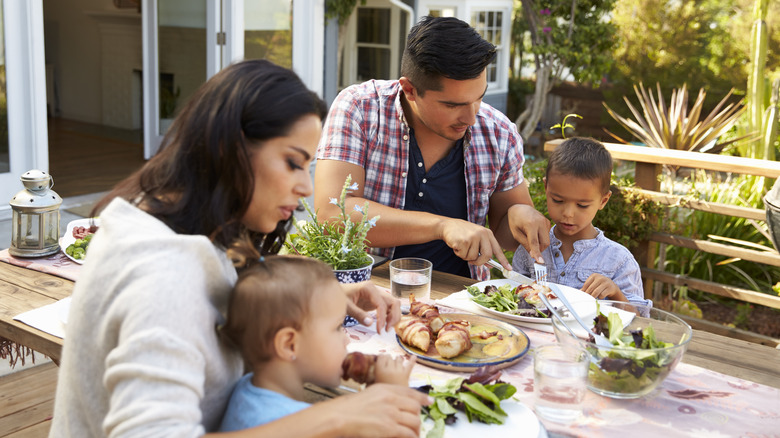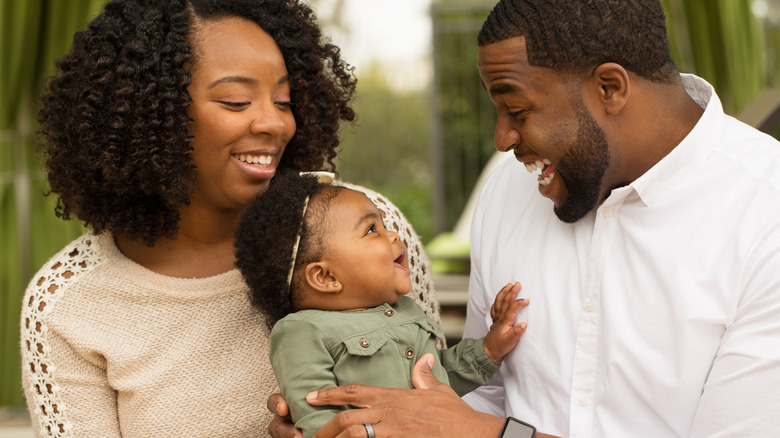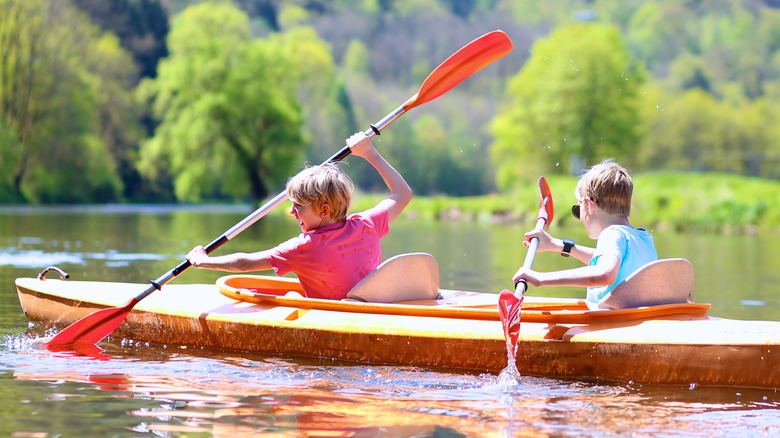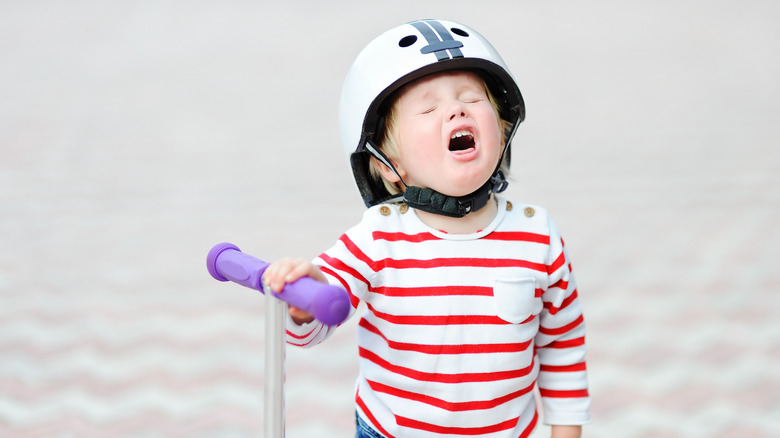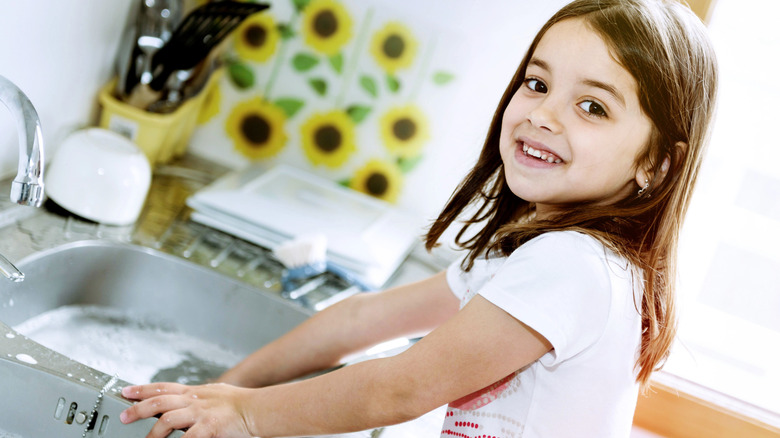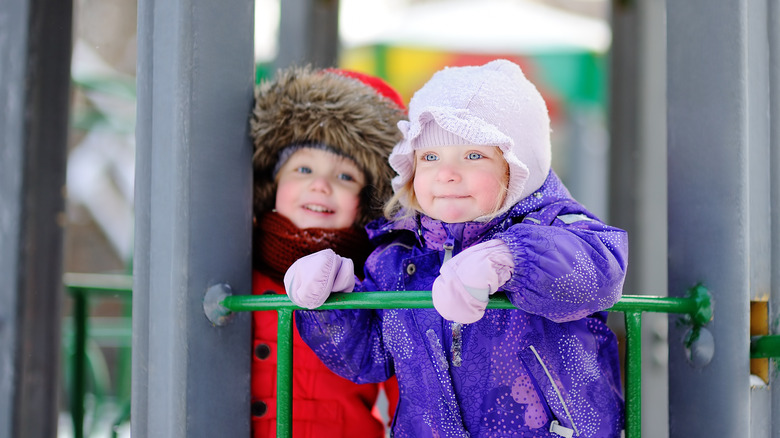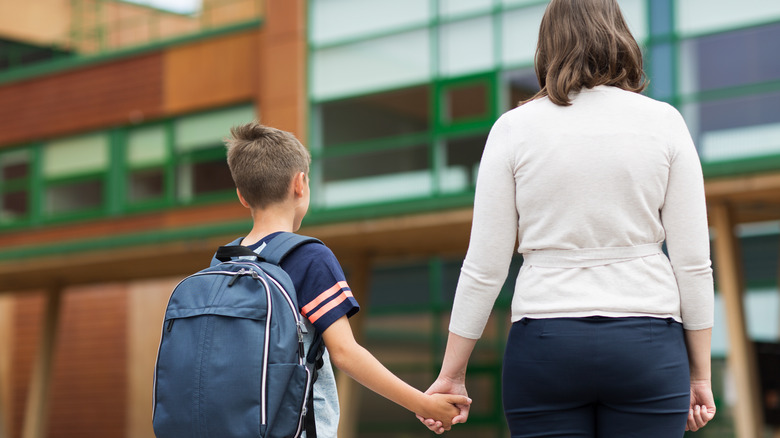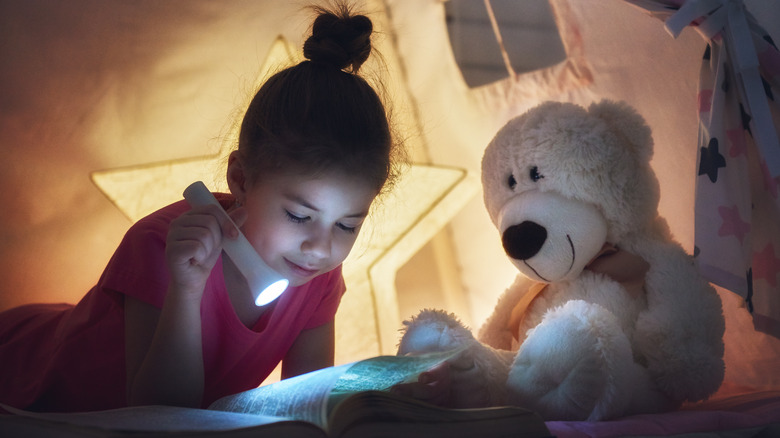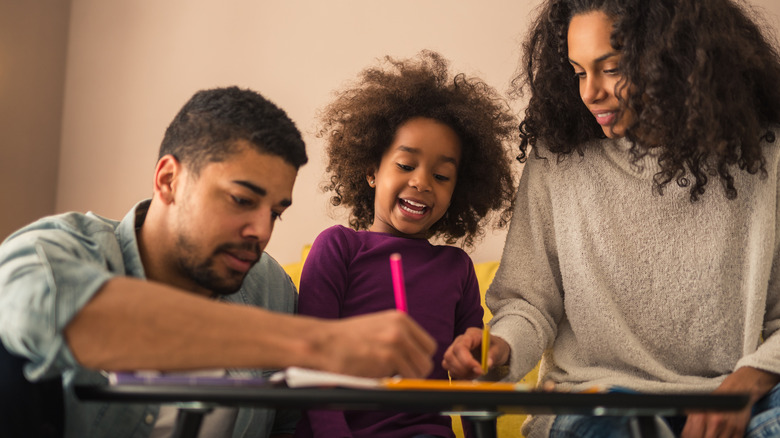Parenting Tips From Around The World
Let's face it: parenting is difficult. While some may feel like they have it all figured out, chances are things still come up that leave you at a total loss. Your seven-year-old and four-year-old have taken all the food storage containers and pots and pans out of every single cabinet, filled them with water, and somehow turned them upside down. How? Why?
While you likely have a routine down pat (bedtime at 7:30 every night, preceded by bath time, books, and a well-balanced dinner with baby food you made yourself), you actually might find yourself reconsidering your game plan after learning about how parenting varies around the world.
From speaking to your little ones as adults and making family time each evening an absolute must, to relaxing that strict 7:30 bedtime and prioritizing time spent outdoors, there's a lot American parents could learn from parents around the world — some of it shocking, some of it downright inspiring. After all, if there's one thing that parents all around the world share, it's the common goal of doing what's best for their children, and their families.
Feed your kids the same meal you're eating
In the land of kids' menus and Happy Meals, where "kid food" is seemingly its own, set category, it might be surprising to hear that in some other countries, kids eat whatever their parents and other family members are served. No chicken nuggets, cheese pizza, or macaroni and cheese while Mom noshes on a noodle bowl.
According to mom.me, many cultures around the world eschew the idea of a separate kids' menu. In South Korea, for instance, kids learn to eat some of everything that's placed on the table come mealtime. That means they're eating a variety of vegetables — likely including those that are fermented or pickled — grains, proteins, and whatever else makes up the meal that day. Kids start eating a ton of different healthy foods from a young age. It's simply the normal thing to do.
Start potty training even earlier
What if you could do without all of the diapers, changings, and accidents of the baby and early toddler years? According to an interview on The Mother Company, in parts of China and India, children as young as six months start potty training using special pants that split at the crotch, allowing them to go without having to get their little pants off in time. Babies crawl or run around without pants or diapers, as well, and having an "accident" on the ground is no big deal — they're still learning, after all. According to the article, this method means that many of these kiddos are sufficiently potty trained much sooner than their American counterparts.
Additionally, in Vietnam, some babies are taught to pee when their parents whistle, according to the Journal of Pediatric Urology. While this may sound odd to American parents, Vietnamese babies are often potty trained by the time they're nine months old.
Ditch the baby talk
Baby talk is sometimes controversial in the United States, with some parents arguing that it might slow babies' language development and others saying that it's no big deal. According to PureWow, in France, adults speak to babies and small children just like they would to anyone else, as a sign of respect.
Teach your kids to leave you
In an interview with ideas.ted.com, clinical psychologist and author of The Blessing of a B Minus: Using Jewish Teachings to Raise Resilient Teenagers, Wendy Mogel, explained that according to Jewish teachings, parents must teach their children to swim. The reasoning for this? To teach your kids the skills and independence required to grow up and thrive as successful human people.
Additionally, according to Rodale's Organic Life, in Germany, kiddos three-and-a-half years of age and older are taken for a three-night stay at a rural, overnight camp each Spring. There, they learn to be more independent and have fun away from their parents, but — understandably — it can be just as tough on the parents as it is on the kids, especially that first year.
Don't indulge bad behavior
It can be difficult not to give in to your toddler's demands when they're pitching a fit, but according to PureWow, however, Italian parents make an effort to never indulge bad behavior. If their kiddos are throwing a tantrum, they let them do so freely, in an effort to show that screaming, crying, and otherwise carrying on isn't the way to get whatever it is they want.
Share a family meal
This is something that lots of families all around the world do on a somewhat regular basis. According to Parenting, Egyptian, Italian, and Argentinian parents (among others) emphasize regular long-lasting gatherings of family and friends to bond over meals. It might not seem like a big deal, but kids will build and strengthen important familial relationships that will last throughout the course of their lives.
Kids should earn their keep
According to The Mother Company, even the youngest Mayans in Central America are given household (or farm-based) tasks from an early age. This helps them develop a strong work ethic, lets them own their work and responsibilities, and helps contribute to the family. Kids are expected to work and assist with family finances from a young age, so the experience with chores and other responsibilities is invaluable.
Get kids some fresh air
In Scandinavian countries, kids spend time outside every single day. In Denmark, for instance, it's not uncommon to see babies in strollers lined up outside of shops and restaurants, even when it's chilly, as caregivers and family members eat or shop indoors, according to ted.ideas.com.
And in Norway, kiddos nap outdoors, even in sub-zero temperatures, according to Rodale's Organic Life. Why would parents park their prams outdoors in freezing winter temps? The BBC reports that these parents believe the practice keeps their little ones healthy.
Cuddle up
Many moms love on their babies every day. After all, what's a better way to begin or end your day than with some sweet baby snuggles?
In India, moms give their babies gentle massages each day, and do not use strollers, but rather carry their babies against their own bodies, and co-sleep with younger children, according to Dr. Vicki Ritts, a St. Louis Community College associate professor of Psychology and Behavioral Science, in her paper, Infusing Culture into Parenting Issues. For each and every one of these habits, the reasoning is that they will facilitate the development of a strong and very close mother-child relationship.
Don't look your baby in the eye
This is one global parenting tip that might leave some American parents shaking their heads, but the reasoning behind it might clear things up. According to Humanity: An Introduction to Cultural Anthropology, the Gusii people who live in Kenya avoid looking babies in the eye because eye contact conveys power.
In a post for Empowering Parents, social worker James Lehman writes that parents should be the rulers of the roost, not their babies or children. And according to researchers (via Cracked), Gusii kiddos grow up less attention-seeking than others.
Don't push them too hard
Many parents and caregivers put a lot (a lot) of pressure on their kids growing up. Of course you want them to be successful, and ambitious, and do all of the things they dream of doing, and you think pushing them do everything "perfectly" is the way to make all of that happen.
According to ideas.ted.com, however, parents in the Netherlands favor downtime, food, and a happy and soothing atmosphere in which to raise their kids, rather than rigorous academics and too much stress. It can be challenging, growing up and following your dreams, but balancing that out with plenty of time to rest, might have some benefits as well.
Don't fret over bedtime
Do you know that one parent who, when they're out with their kid in tow, has to hightail it home to make sure the bedtime routine isn't disrupted? (Are you that parent?)
According to Rodale's Organic Life, Spanish kids often don't go to bed until close to 10 at night. Between afternoon or evening siestas, and plenty of family time built in to the early evening hours, it makes sense that bedtime is typically later. While researchers aren't sure the late-night bedtimes are good for the kids, it doesn't necessarily look like parents will start putting their kids to bed before family time.
Global inspiration
There are many things that American parents and caregivers feel are essential for "proper" parenting, but many of their counterparts around the world do at least some things differently.
While you might not agree with everything everyone else does, American parents and caregivers just might learn a bit about raising kids, from the parents and caregivers in other cultures. After all, child-rearing often does take a village. Who's to say what the size of your village is?
